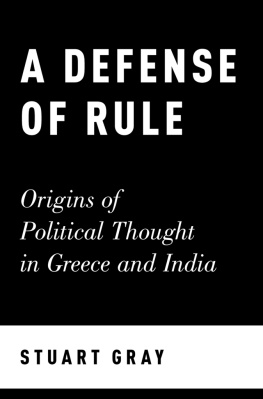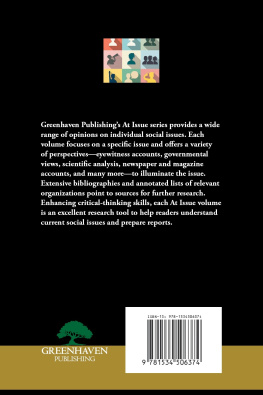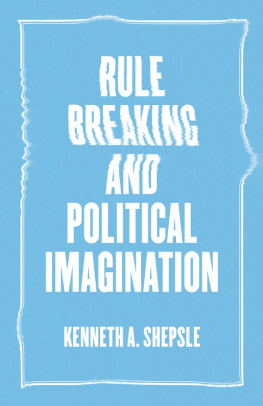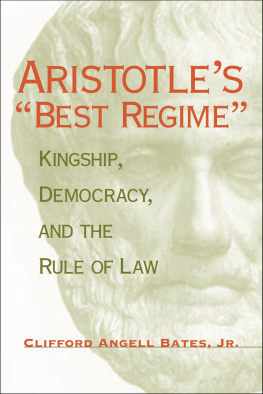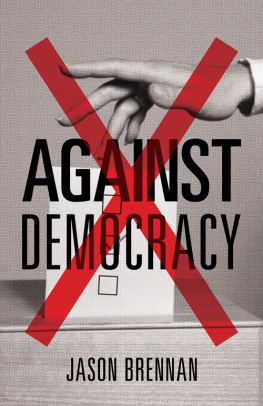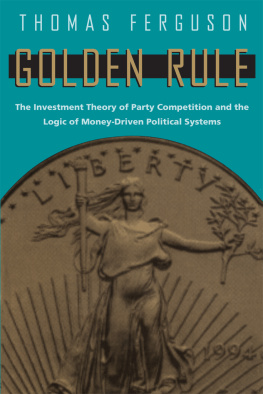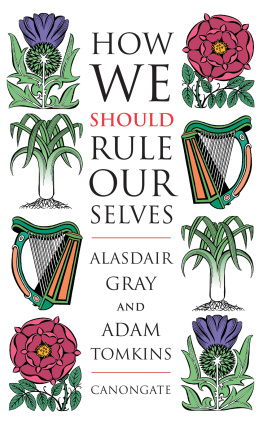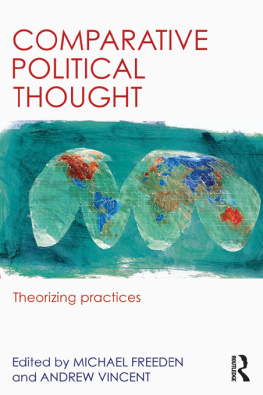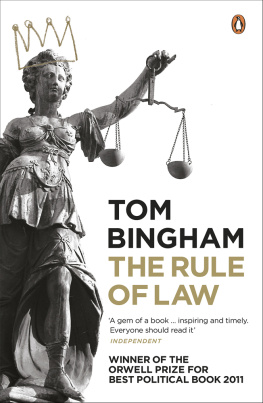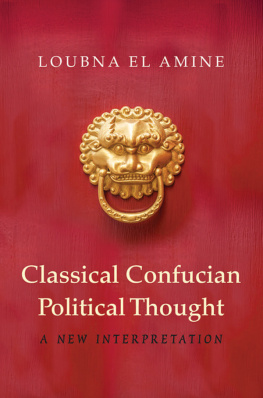A DEFENSE OF RULE

Oxford University Press is a department of the University of Oxford. It furthers the Universitys objective of excellence in research, scholarship, and education by publishing worldwide. Oxford is a registered trade mark of Oxford University Press in the UK and certain other countries.
Published in the United States of America by Oxford University Press
198 Madison Avenue, New York, NY 10016, United States of America.
Oxford University Press 2017
All rights reserved. No part of this publication may be reproduced, stored in a retrieval system, or transmitted, in any form or by any means, without the prior permission in writing of Oxford University Press, or as expressly permitted by law, by license, or under terms agreed with the appropriate reproduction rights organization. Inquiries concerning reproduction outside the scope of the above should be sent to the Rights Department, Oxford University Press, at the address above.
You must not circulate this work in any other form and you must impose this same condition on any acquirer.
CIP data is on file at the Library of Congress
ISBN 9780190636319
eISBN 9780190658779
CONTENTS
Rethinking the Question and Meaning of Rule
What does it mean to rule? At the core of politics are relations of rule, and thus at the heart of political theory is the question of what it means for human beings to rule over one another and share in a process of ruling. Interestingly, rule has also been one of the most criticized and even villainous of political concepts in the history of political thought, which reasonably leads us to ask the following question: if rule is so lamentable, then shouldnt we attempt to mitigate ruling relations as much as possible within political communities, or perhaps try to eradicate such relations altogether? A central aim of this book is to challenge this negative outlook and explain how rule need not be understood as anathema to political life. Not only has it been one of the most pervasive concepts in the global history of political thought, it is also a complex and potentially inspiring activity in which all people, I will argue, participate throughout their daily livesand stand to do so in a more thoughtful fashion. To advance this claim is to suggest that we must be willing to alter, in a potentially destabilizing way, how we view the concept and reconsider its prospective meaning. I will embark on this project of rethinking the meaning of rule by undertaking two general tasks: first, to enhance the scope of our historical perspective in the Western tradition, and second, to broaden our cross-cultural understanding of rule.
In the chapters that follow, I thus retrieve, and comparatively re-examine, two ancient conceptions of rule that offer fascinatingly different ways of thinking about the concept and its attendant practices. In particular, I show how a comparative encounter between archaic Greek and Vedic Indian traditions provides critical distance from some of our most familiar intuitions about rule. This historical-comparative trek then helps expand our political imagination by supplying alternative ideas and outlooks that might serve as resources for rethinking the meaning of rule. Consequently, I aim not only
Specifically, the Vedic notion of rule can help us better understand our relationship to nonhuman nature as non-instrumental, and a central aim of this book is to explain why human beings have a responsibility or duty to act as stewards for the interests of various nonhuman beings. Here ancient Indian political thought is invaluable because it shows us how the earliest discernableand highly influentialtradition of Greek thought conceives a hierarchical and instrumental relationship between human and nonhuman nature. This instrumental position tends to predominate in the contemporary world and view the nonhuman as a mere resource for enhancing human desires and comforts, thus privileging human interests at the expense of nonhuman interests and well-being. Such instrumental understandings of the nonhuman world have gotten us into serious trouble in the modern and contemporary period. One could cite numerous examples, including deforestation, global warming, rising sea levels, species loss, and peak oil.
As is already evident in the early Greek understanding of rule, a serious problem then arises: nonhuman beings such as animals and plants, let alone entire ecosystems, cannot assert and defend their interests in propria persona. This makes it quite difficult if not impossible to understand how we could take account of nonhuman nature in our political decisions in a way that would be significantly different than our current instrumental approach. An alternative to this overly hierarchical and instrumental conception of rule would be to conceive nonhuman nature as having interests that human beings have a responsibility or duty to account for in both their personal and political decisions. As I will explain at greater length in this Preface and the Conclusion, we must view ourselves as stewards and not simply consumers of the nonhuman world. Importantly, our conceptual vocabulary has room for this conception of stewardship between a human political agent and less capable agents whose interests the full agent is obligated to consider when taking action that affects them all: the concept of rule. Thus reinvigorating the concept of rule seems like a uniquely available and promising way to reconceive of our relationship with nonhuman nature. Early Indian political thought helps us to To explain how this is the case, it is helpful to begin by unpacking and theorizing what I take to be the various dimensions of rule.
The Multidimensionality of Rule and Ruling-in
To start, the concept of rule has a long line of critics offering numerous reasons to be skeptical of ruling relations in general. For example, most Western political theorists have understood rule to mean hierarchical domination of some people by others, often advancing a contrast between rule and politics, with the latter implying some degree of reciprocity of interests and participation. Thus, for those such as Aristotle, a society in which a king governs in his own interest is a corrupt form of rule while the term polis, and thus a truly political society, is reserved for a system wherein citizens experience rough equality and reciprocity by ruling and being ruled in turn. Although ruling entails some people telling others what to do and commanding obedience, Aristotle claims that rule can be turned into politics through an appropriate constitution.
Modern thinkers such as Hannah Arendt follow some of these basic distinctions by categorically parsing rule and politics, associating the more inspiring concepts of equality and freedom with politics, and more troubling concepts of hierarchy and domination with rule. Since Plato, Arendt argues that the Western tradition of political philosophy has attempted to escape the frailty and unpredictability of politics altogether, claiming: The hallmark of all such escapes is the concept of rule, that is, the notion that men can lawfully and politically live together only when some are entitled to command and the others forced to obey (1998, 222). However, I would like to comment on this position, since it aptly characterizes many modern and contemporary arguments against rule.
First, politics entails making impactful decisions and does not merely center on self-display in a condition of plurality. Ruling, understood as If we do not locate and pay special attention to these hierarchies, and consider the interests of those who find themselves subjected, this can easily lead to unjustified forms of domination. To take a Greek example, while Aristotle argues that free and equal male citizens of a

